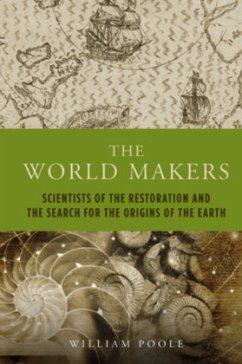When educated men in the seventeenth century thought about the Earth on which they stood, they might ask themselves the following questions. When was the world created? Why? How? Out of what? Where did people come from? Do we all share the same origin? How were other living things generated? Can species vary at all? What are fossils? The common answers to these questions were rooted in the Bible. The world was made around the year 4000 BC by the direct command of God; people all come from Adam and Eve; species do not vary and fossils are inorganic in origin. Most people assumed that the teachings of theology and of natural philosophy (what we would later term 'science') were both continuous and harmonious. But there were radical new answers to these questions of origin too.
This is the story of how the emerging discipline of experimental philosophy reacted to the opening chapters of the book of Genesis to interpret the physical origin, present status, and final destination of the Earth. The Royal Society of London, created in 1660 'for the improving of natural knowledge', was where these bold new answers to old questions were formulated, discussed, contested, and modified, by men such as Isaac Newton, Robert Hooke, Edmond Halley, and Thomas Burnet.
This is the story of how the emerging discipline of experimental philosophy reacted to the opening chapters of the book of Genesis to interpret the physical origin, present status, and final destination of the Earth. The Royal Society of London, created in 1660 'for the improving of natural knowledge', was where these bold new answers to old questions were formulated, discussed, contested, and modified, by men such as Isaac Newton, Robert Hooke, Edmond Halley, and Thomas Burnet.
"'The World Makers' offers a rich and detailed account of late seventeenth-century theories of the Earth. Written with impeccable scholarship and a highly engaging prose style, this book sheds considerable light on a seminal period in the history of modern science." (Professor Peter Harrison, University of Oxford)
"Though modestly presented as an introduction to debates over cosmogonies, this brief volume brilliantly captures a crucial moment in the history of modern science as well as erudition. With seeming ease and a keen eye for the telling detail, Poole navigates the intricacies of several disciplines that helped mould these debates - from Scripture and mythology to philosophy and natural history. His lucid explication of the momentous clash of old and new ideas over the formation, the age, and habitation of the Earth will appeal to both specialists and lay readers." (Professor Mordechai Feingold, California Institute of Technology)
"William Poole's 'The World Makers' does more than contribute a seminal overview of late seventeenth-century English and European discussions on the natural and biblical history of our world: it demonstrates the central role these played in debates on biblical exegesis, antiquarianism, the origin of man's tribes, languages and civilizations, debates that fascinated the learned community of the time, and continued to do so for at least two centuries." (Professor Pietro Corsi, University of Oxford)
"(...) Poole's intelligent and crisply written history will make valuable reading for anyone interested in how early English scientists obsessed about their world." (James Delbourgo, Times Higher Education)
"'The World Makers' is a very fine work of intellectual history, and the first to explain the 'earth theories' in a satisfying way and adequately to situate them in their intellectual world." (Alexander Wragge-Morley, British Journal for the History of Science)
"Poole has written a splendid book, which clarifies the complex intellectual scene that existed in the second half of the seventeenth and early eighteenth century in England and displays the details and nature of the soil from which grew a number of the modern sciences. In fact the complexity of the situation is brought into focus for the first time in his exegesis. His impressive historical research reveals a mass of interconnecting strands of thought, in a topic that has never, I think, previously been treated in such detail." (David Oldroyd, Archives Internationales d'Histoires des Sciences 62, 2012)
"Though modestly presented as an introduction to debates over cosmogonies, this brief volume brilliantly captures a crucial moment in the history of modern science as well as erudition. With seeming ease and a keen eye for the telling detail, Poole navigates the intricacies of several disciplines that helped mould these debates - from Scripture and mythology to philosophy and natural history. His lucid explication of the momentous clash of old and new ideas over the formation, the age, and habitation of the Earth will appeal to both specialists and lay readers." (Professor Mordechai Feingold, California Institute of Technology)
"William Poole's 'The World Makers' does more than contribute a seminal overview of late seventeenth-century English and European discussions on the natural and biblical history of our world: it demonstrates the central role these played in debates on biblical exegesis, antiquarianism, the origin of man's tribes, languages and civilizations, debates that fascinated the learned community of the time, and continued to do so for at least two centuries." (Professor Pietro Corsi, University of Oxford)
"(...) Poole's intelligent and crisply written history will make valuable reading for anyone interested in how early English scientists obsessed about their world." (James Delbourgo, Times Higher Education)
"'The World Makers' is a very fine work of intellectual history, and the first to explain the 'earth theories' in a satisfying way and adequately to situate them in their intellectual world." (Alexander Wragge-Morley, British Journal for the History of Science)
"Poole has written a splendid book, which clarifies the complex intellectual scene that existed in the second half of the seventeenth and early eighteenth century in England and displays the details and nature of the soil from which grew a number of the modern sciences. In fact the complexity of the situation is brought into focus for the first time in his exegesis. His impressive historical research reveals a mass of interconnecting strands of thought, in a topic that has never, I think, previously been treated in such detail." (David Oldroyd, Archives Internationales d'Histoires des Sciences 62, 2012)








